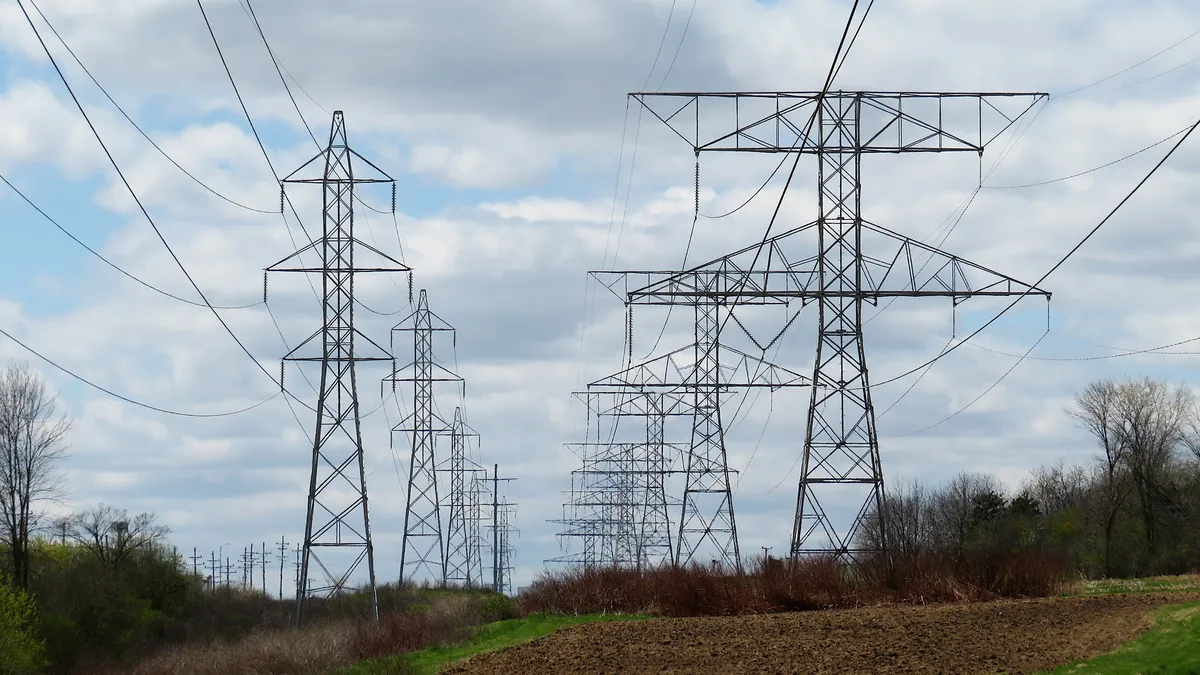Dive Brief:
-
Utility regulators, attorneys general and ratepayer advocates from eight states and the District of Columbia are urging the Federal Energy Regulatory Commission to reject calls to give incumbent utilities the right of first refusal (ROFR) to build transmission lines in their service territories that offer regional benefits.
-
Disagreeing with the Edison Electric Institute (EEI), a trade group for investor-owned utilities, the state officials also said an independent monitor is needed to help oversee transmission planning for separate regions, which they said would help keep costs lower, according to comments filed Friday at FERC.
-
"Of course, states and consumer interests are pushing back on EEI's self-interested request for a monopoly on the clean energy transition," Sharon Segner, vice president for LS Power Development, a company that develops generating and transmission projects, said in an email Monday.
Dive Insight:
The comments from the state officials come as FERC is considers revamping its rules around transmission planning, cost allocation and interconnecting generating facilities to the grid.
In an initial round of filings in October in response to FERC's advanced notice of proposed rulemaking (ANOPR), EEI and utilities told the agency that FERC-approved competitive bidding processes for building regional transmission facilities have largely failed. Instead, FERC should give utilities the right to build those lines without involving third-party transmission developers, they said.
However, state officials want FERC to maintain bidding processes for regional transmission projects.
"The discriminatory effect of the ROFR and its anti-competitive impact have been fully reviewed and evaluated by the commission and there is no reason to reopen that settled matter," the state officials said. "Competition reduces costs, compels developers to sharpen their pencils, results in better projects, and saves ratepayers money."
The comments from EEI and Eversource Energy, a utility company based in Springfield, Mass., were "self-serving," according to the state officials.
The state officials and ratepayer advocates urged FERC to dismiss Eversource's argument that competitive processes have led to delays in transmission development, noting ISO New England has held only one competitive transmission solicitation and it was won by Eversource, in partnership with National Grid.
"The facts are that Eversource has only been involved in one competitive transmission procurement in New England, a procurement that was done quickly and cooperatively with no discernable delay and has widely been considered effective," the state officials said.
The group, including officials from officials from Connecticut, the District of Columbia, Delaware, Maryland, Massachusetts, Minnesota, New Jersey, Rhode Island and Vermont, reiterated that FERC should establish regional independent transmission monitors.
"An independent transmission monitor may be an effective way to control costs, review and improve planning and decision-making procedures, and provide increased transparency," the group said.
The officials said the EEI was offbase to claim that existing transmission planning processes are sufficiently open to stakeholders.
"State officials and the public most certainly do not have sufficient insight or access to information and little to no opportunity to meaningfully participate in the transmission planning process," they said.
In decisions upheld in court, FERC has found that the right of first refusal for incumbent utilities was not in the public interest, according to LS Power's Segner.
"EEI's request isn't in the public interest," Segner said. "States and consumers see the benefit of competition, and the ANOPR comments filed by states and consumers overwhelmingly support more transmission competition."
However, EEI contends competitive transmission processes have been ineffective at spurring new transmission facilities.
Since FERC partly eliminated the ROFR, transmission development for competitive projects has stalled and process-related costs have escalated, impeding efforts to make the grid more reliable and give customers access to renewable energy, according to Adam Benshoff, EEI vice president of regulatory affairs.
“Electric companies efficiently deploy capital using competitive processes at every stage of transmission development and construction (i.e., engineering, materials, construction, etc.),” Benshoff said Monday in an email.
The competitive process for selecting transmission projects has stifled the cooperation that has historically existed among transmission owners, as well as regional planning entities, as stakeholders have become competitors, Benshoff said.
Editor's Note: This story has been updated with comments from EEI.















